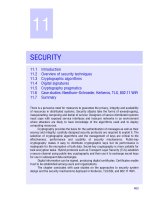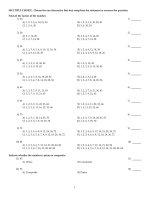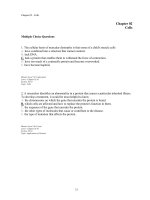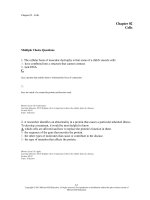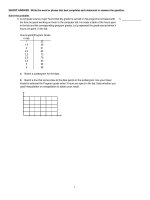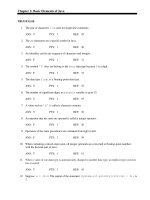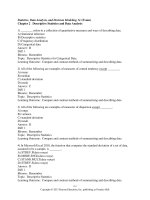Lecture Contemporary strategy analysis: Concepts, techniques, applications (5th edition): Chapter 17 - Robert M. Grant
Bạn đang xem bản rút gọn của tài liệu. Xem và tải ngay bản đầy đủ của tài liệu tại đây (242.28 KB, 7 trang )
<span class='text_page_counter'>(1)</span><div class='page_container' data-page=1>
<b>Current Trends in Strategic Management</b>
<b>Current Trends in Strategic Management</b>
•
<b>The New Economy</b>
•
<b>New Directions in Strategic Thinking</b>
•
<b>Redesigning the Organization</b>
•
<b>New Modes of Leadership</b>
</div>
<span class='text_page_counter'>(2)</span><div class='page_container' data-page=2>
<b>The Turbulent 21</b>
<b>st</b>
<b> Century</b>
<b>The Turbulent 21</b>
<b>st</b>
<b> Century</b>
<b>Collapse of New </b>
<b>Economy</b>
•<b>Dot.com bubble bursts</b>
•<b>TMT recession</b>
<b>Collapse of New </b>
<b>Economy</b>
•Dot.com bubble bursts
•TMT recession
<b>Corporate Scandals</b>
•<b> Enron, WorldCom, Parmalat</b>
•<b> Jack Welch’s retirement package </b>
<b>Corporate Scandals</b>
•<b> Enron, WorldCom, Parmalat</b>
• Jack Welch’s retirement package
<b>War</b>
•<b> Invasion of Afghanistan</b>
<b> & Iraq</b>
•<b>Civil was in Congo,</b>
<b> Liberia, Sudan </b>
<b>War</b>
• Invasion of Afghanistan
<b> & Iraq</b>
•Civil was in Congo,
<b> Liberia, Sudan </b>
<b>Age of </b>
<b>Disbelief</b>
<b>Age of </b>
<b>Disbelief</b>
<b>The Curse of</b>
<b>Terrorism</b>
•
<b>Sept. 11, 2001</b>•<b>Suicide bombings in </b>
<b>Israel, Iraq, Saudi </b>
<b>Arabia, Turkey, </b>
<b>Afghanistan</b>
<b>The Curse of</b>
<b>Terrorism</b>
•
<b>Sept. 11, 2001</b>•Suicide bombings in
<b>Israel, Iraq, Saudi </b>
<b>Arabia, Turkey, </b>
<b>Afghanistan</b>
<b>Fear of Disease</b>
•<b>SARS, Mad Cow, Bird </b>
<b>Flu</b>
<b>Fear of Disease</b>
•SARS, Mad Cow, Bird
<b>Flu</b>
<b>Unstable </b>
<b>Currencies</b>
<b>US$ declines by >50% against </b>
<b>Euro 2002-04</b>
<b> </b>
<b>Unstable </b>
<b>Currencies</b>
<b>US$ declines by >50% against </b>
<b>Euro 2002-04</b>
<b> </b>
<b>Decline of </b>
<b>Multilateralism</b>
•<b>Collapse of Doha round</b>
• Trade wars between US, EU, China
•Weakening of UN
<b>International</b>
<b>competition intensifies</b>
</div>
<span class='text_page_counter'>(3)</span><div class='page_container' data-page=3>
<b>0</b>
<b>1</b>
<b>2</b>
<b>3</b>
<b>4</b>
<b>5</b>
<b>6</b>
<b>7</b>
<b>1995 1996 1997 1998 1999 2000 2001 2002 2003</b>
<b>Q1</b>
<b>Q2</b>
<b>Q3</b>
<b>Q4</b>
<i><b>Source: </b></i><b>Bureau of Labor Statistics</b>
<b>US Labor Productivity: Changes in Non-Farm Output</b>
<b> per Hour Worked from Year ago Quarter, 1995-2003</b>
</div>
<span class='text_page_counter'>(4)</span><div class='page_container' data-page=4>
<b>Return on Equity of US Manufacturing</b>
<b> Corporations, 1990-2003</b>
<b>Return on Equity of US Manufacturing</b>
<b> Corporations, 1990-2003</b>
<b>0</b>
<b>2</b>
<b>4</b>
<b>6</b>
<b>8</b>
<b>10</b>
<b>12</b>
<b>14</b>
<b>16</b>
<b>18</b>
<b>1990 1991 1992 1993 1994 1995 1996 1997 1998 1999 2000 2001 2002 2003</b>
<b>ROE ( %)</b>
</div>
<span class='text_page_counter'>(5)</span><div class='page_container' data-page=5>
<b>0</b>
<b>0.5</b>
<b>1</b>
<b>1.5</b>
<b>2</b>
<b>2.5</b>
<b>3</b>
<b>3.5</b>
<b>4</b>
<b>4.5</b>
<b>1990 1992 1994 1996 1998 2000 2002</b>
<b>$ trillion</b>
<b>The value of mergers and </b>
<b>acquisitions worldwide</b>
<b>The value of mergers and </b>
<b>acquisitions worldwide</b>
</div>
<span class='text_page_counter'>(6)</span><div class='page_container' data-page=6>
<i><b>Key Trends of the 1990s:</b></i>
•
<b>Quest for shareholder value</b>
•
<b>Adjusting to increased</b>
<b> turbulence & more intense </b>
<b>competition</b>
<i><b>Influential Strategy Concepts:</b></i>
•
<b>Modern financial analysis</b>
<b> —shareholder value, economic profit,</b>
<b> option theory</b>
•
<b>Core competences and intangible</b>
<b> assets</b>
•
<b>Dynamically competitive markets</b>
<b> —“</b>
<i><b>hypercompetition”</b></i>
•
<b>Competitive advantage through</b>
<b> alliances, networks, and standards</b>
<i><b>Major Themes of Business </b></i>
<i><b>Strategy:</b></i>
•
<b>Cost cutting—squeezing </b>
<b> overhead, business process </b>
<b> engineering, increasing labor </b>
<b> productivity</b>
•
<b>Outsourcing/refocusing/</b>
<b> divestment</b>
•
<b>Performance management and</b>
<b> incentive alignment</b>
<b>Directions in Strategic Management </b>
<b>Practice—Trends of the 1990s </b>
</div>
<span class='text_page_counter'>(7)</span><div class='page_container' data-page=7>
<i><b>Future Sources of Profit</b></i>
<b>Limits of downsizing/cost cutting</b>
<b>Where are future sources of </b>
<b>profit?</b>
<i><b>Technology</b></i>
<b>Continued advances in ICT</b>
<b>Forces Shaping Company Strategies 2001-04</b>
<i><b>Concepts & Theories</b></i>
•
<b>Resources & capabilities as</b>
<b> basis for competitive advantage</b>
•
<b>Knowledge-based theory</b>
<b> of the firm</b>
•
<b>Option theory</b>
•
<b>Complexity theory</b>
<i><b>The Business </b></i>
<i><b>Environment</b></i>
•
<b>Uncertainty</b>
•
<b>Stalling of economic</b>
<b> liberalization</b>
•
<b>Intense competition</b>
<i><b>Demands of society</b></i>
•
<b>Social & environmental responsibility</b>
•
<b>Ethics & fairness</b>
</div>
<!--links-->

